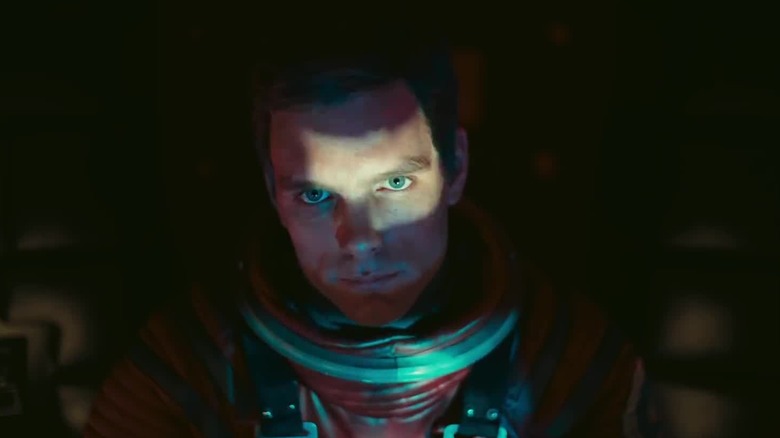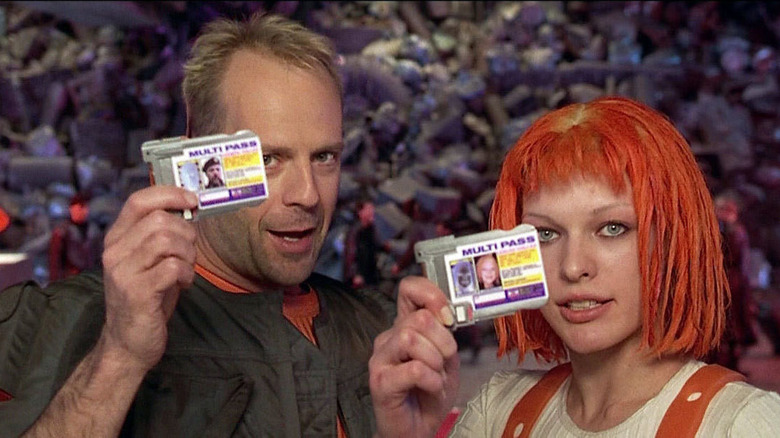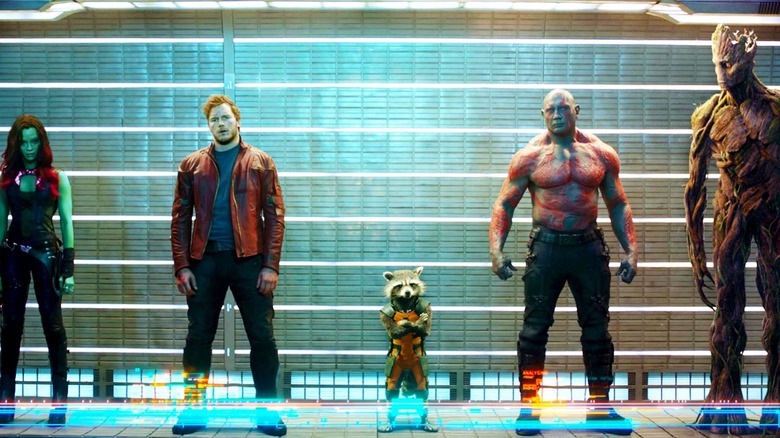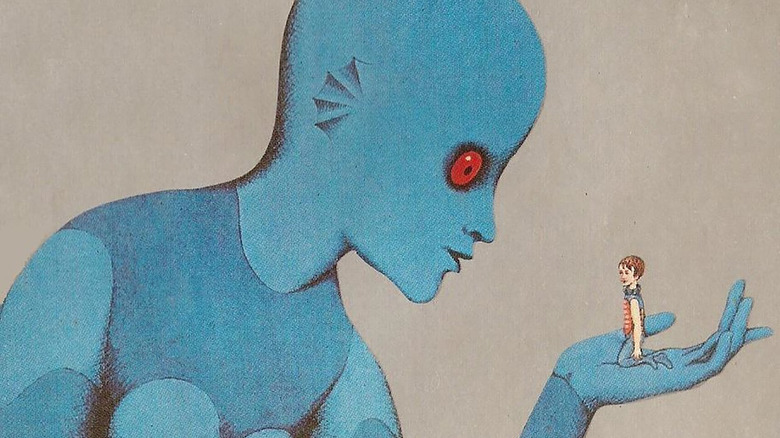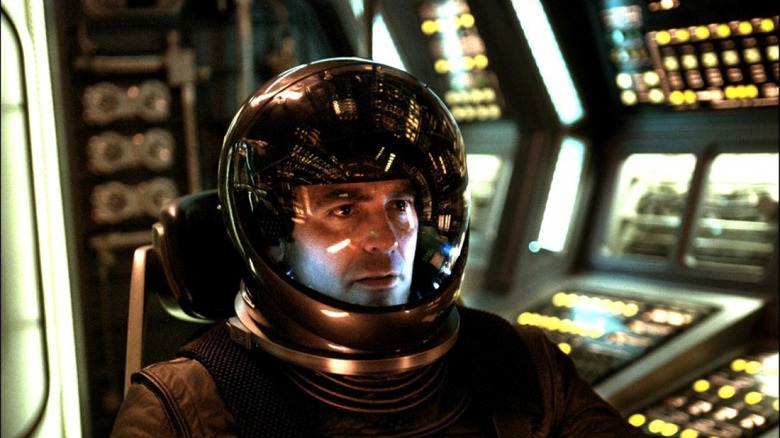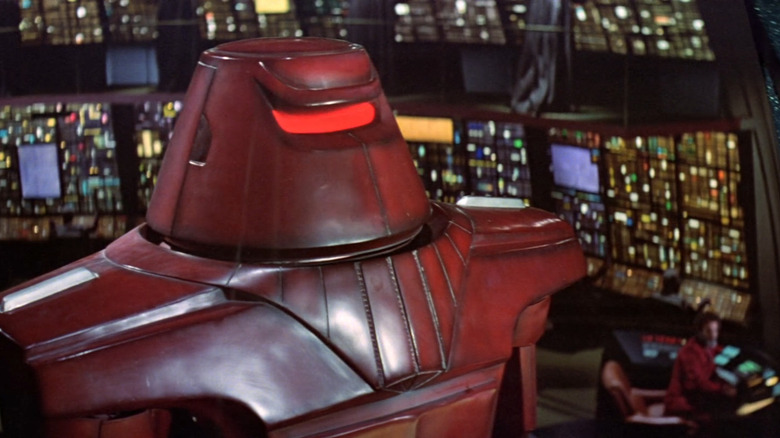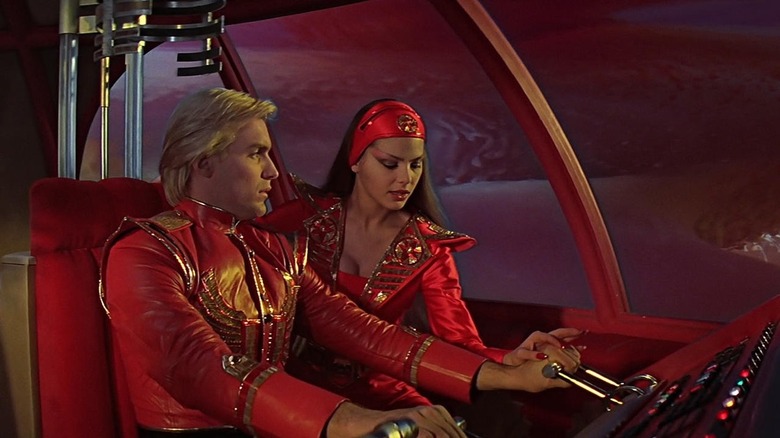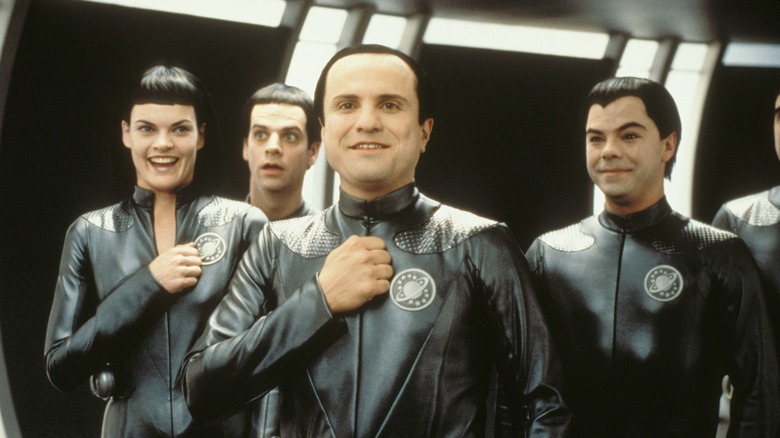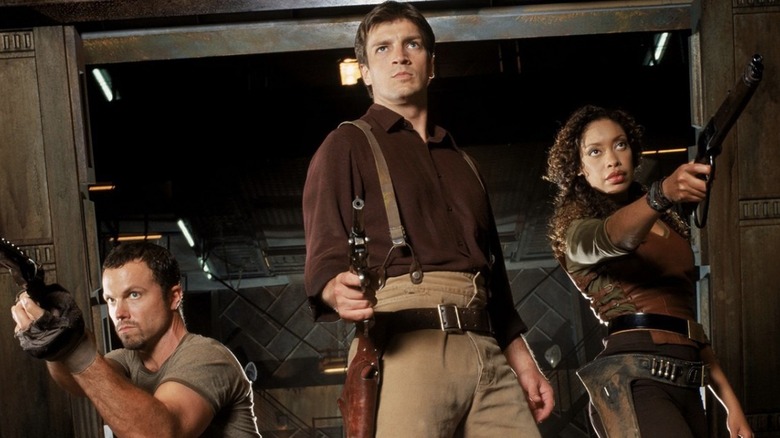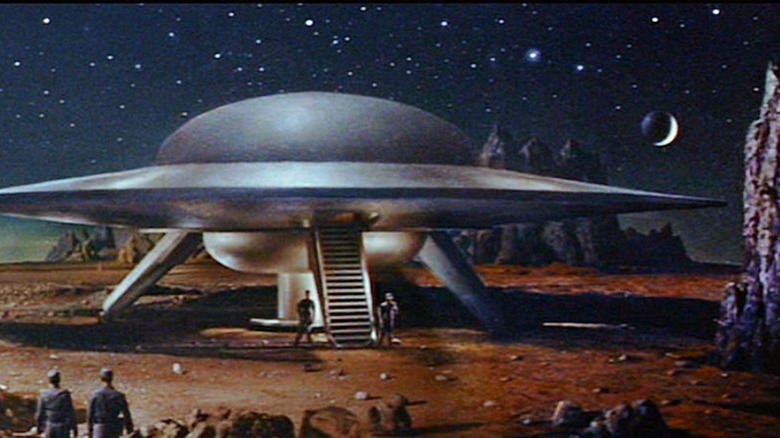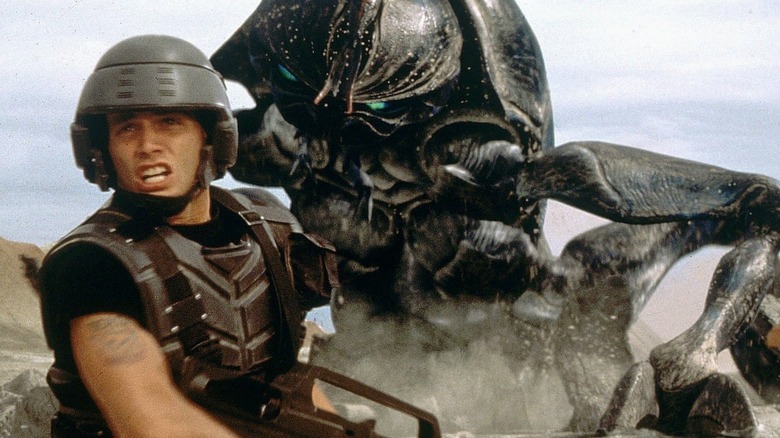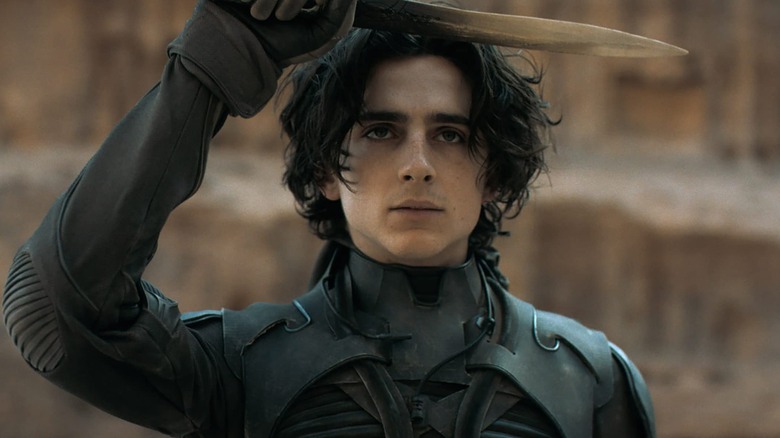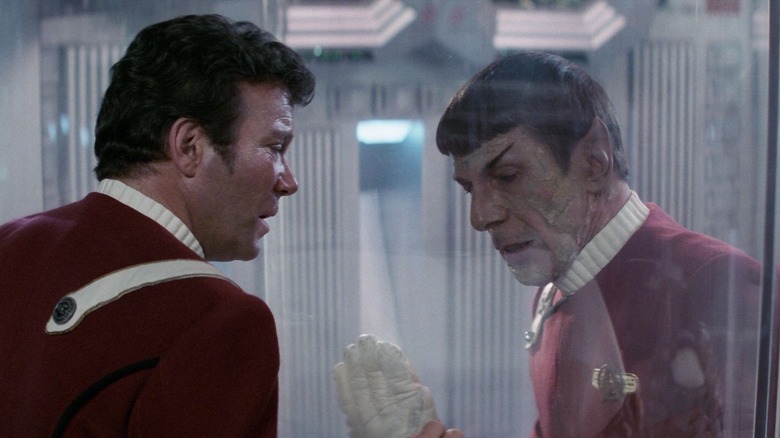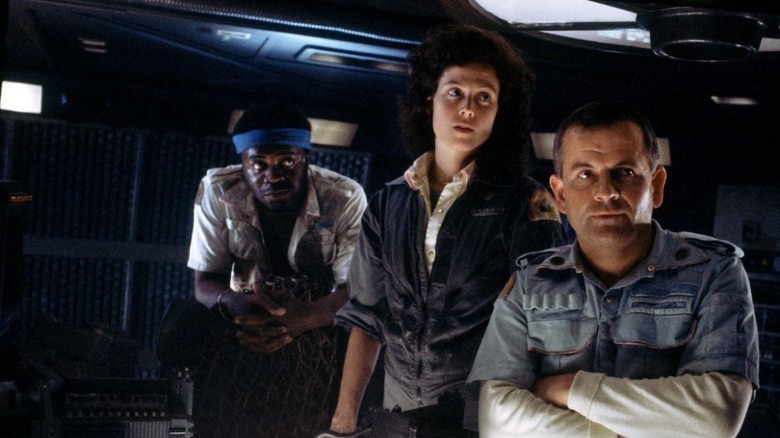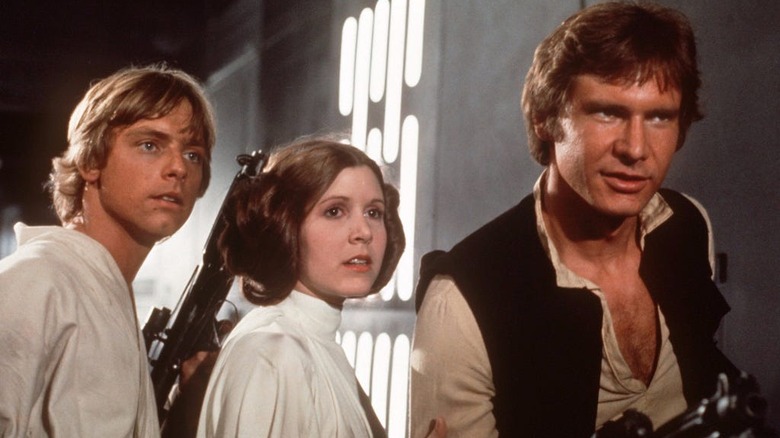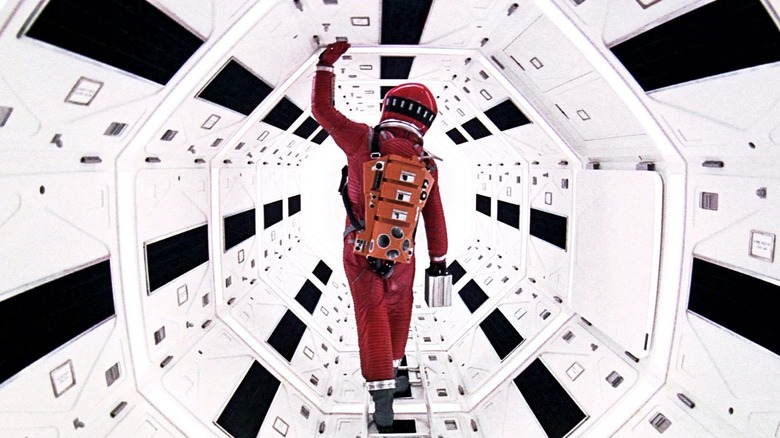The 15 Best Space Opera Movies, Ranked
Ever since the earliest days of cinema, audiences have flocked to the movie theater to escape reality. Science fiction films explore the possibilities of the future, how developments in technology impact humanity, and imagine what space travel and distant galaxies might look like. Space films sometimes even predict real scientific achievements before they actually happen: In 1902, the adventure short film "A Trip to the Moon" featured astronauts landing on the lunar surface long before the "Apollo 11" mission was ever in the works at NASA.
The term "space opera" was inspired by the "horse opera" genre of western adventure films. Similar to their western counterparts, space operas feature sensational stories with easily identifiable heroes and villains. The genre first took off in the 1930s with the success of serial films like the "Flash Gordon" and "Buck Rogers" franchises.
Space operas continue to be popular today. Although many of the best space operas are older classics, several modern filmmakers have reinvented the genre over the years. Here are the 15 greatest space opera movies ever made, ranked.
15. The Fifth Element
"The Fifth Element" is a truly wild film.
So much so, in fact, that Luc Besson's hyper-stylized, over-the-top vision of the future may not be for everyone. However, for those who enjoy space operas that are unafraid to get weird, "The Fifth Element" is a cult classic. It was a passion project for the idiosyncratic filmmaker, who first conceived of the story when he was a teenager. In Besson's dystopian future, it's unsurprisingly a motley group of heroes who are tasked with saving the universe.
The film is set in the 23rd century, where Earth is ruled by corporate leaders. The wicked Jean-Baptiste Emanuel Zorg (Gary Oldman) sends his alien assassins to capture the super-powered warrior Leeloo (Milla Jovovich). Leeloo receives unexpected assistance from the flying taxicab driver Dallas (Bruce Willis). Once a member of Earth's military forces, Dallas must return to his former profession to help Leeloo save the universe.
14. Guardians of the Galaxy
Superhero stories have drawn heavy inspiration from space operas, and the modern Marvel Cinematic Universe has embraced its intergalactic origins. However, 2014's "Guardians of the Galaxy" was the first film that truly embraced the interstellar possibilities of the franchise. The story of "Guardians of the Galaxy" feels closer to classic space operas like "Star Wars" or "Flash Gordon" than it did a traditional superhero story.
James Gunn's rollicking adventure was a breath of fresh air. The film's heroes aren't altruistic do-gooders; they're a band of misfits that form a strange dysfunctional family. The outlaw Peter Quill (Chris Pratt), the assassin Gamora (Zoe Saldana), the warrior Drax (Dave Bautista), and the bounty hunters Rocket Racoon (Bradley Cooper) and Groot (Vin Diesel) have been treated like "losers." Surprisingly, they end up becoming the only heroes that can stand up to the evil Ronan the Accuser (Lee Pace). Gunn's eclectic soundtrack of 1970s hits made the film feel even more distinct.
13. Fantastic Planet
Space operas originated in comic book strips, and animation is sometimes the best tool for bringing these imaginative stories to life. There are many great animated space operas, but few have left the same lasting legacy as the 1973 avant-garde film "Fantastic Planet." The film tells a metaphorical story about life on the planet Ygam, where humans are kept as pets by the blue alien creatures the Traags. Inspired by Stefan Wul's French science fiction novel "Oms en série," "Fantastic Planet" is one of the most visually stunning animated films ever made.
"Fantastic Planet" explores themes of intolerance, societal constructs, and oppression. The Traags don't think they are treating the humans cruelly, as they believe themselves to be superior. The Traag society has developed advanced technology to control the human population. The humans begin to resist, and the Traags must determine whether they should crush the rebellion or learn to co-exist. The role-reversal was an interesting allegory for animal rights.
12. Solaris
Andrei Tarkovsky's 1972 film "Solaris" is a beloved science fiction classic, but surprisingly (according to some fans), Steven Soderbergh's 2002 remake was able to top the original. Unfortunately, Soderbergh's version was met with an intensely negative reaction from most general audiences when it was first released. The film bombed at the box office, and earned a rare "F" Cinemascore from audiences. Soderbergh's "Solaris" was not intended for crowds that didn't appreciate arthouse cinema; he'd combined the space opera with psycho-sexual elements to create a surrealist nightmare.
"Solaris" follows Dr. Chris Kelvin (George Clooney), a psychologist who is approached by the enigmatic DBA corporation to join the crew of a space station orbiting the distant planet Solaris. Kelvin is skeptical because DBA has given him little information about the assignment, but his friend Gibarian (Ulrich Tukur) urges him to join the critical mission. During the interstellar voyage to the planet, Kelvin receives mysterious visions of his dead wife Rheya (Natascha McElhone). He is unable to separate his dreams from reality.
11. The Black Hole
"The Black Hole" is an oddity among the space operas of the 1970s. It was the first PG-rated film from Walt Disney Pictures, and took a deeply philosophical approach to the genre. Perhaps it is unsurprising in retrospect that a slowly-paced film was unsuccessful, as audiences may have expected a more exciting space opera adventure along the lines of "Star Wars" or "Superman: The Movie." However, "The Black Hole" is a hidden gem that science fiction fans should check out.
"The Black Hole" takes place in the distant future after interstellar travel has become possible. The crew of the USS Palomino spaceship discovers a black hole. They suspect that the long-lost ship the USS Cygnus was lost in the region 20 years prior. Captain Dan Holland (Robert Forster), First Officer Lieutenant Charlie Pizer (Joseph Bottoms), reporter Harry Booth (Ernest Borgnine), scientist Dr. Kate McCrae (Yvette Mimieux), ambassador Dr. Alex Durant (Anthony Perkins), and the sentient robot, V.I.N.CENT. (Roddy McDowell), search for the Cygnus. They discover that a mysterious extraterrestrial force has been influencing the destiny of both missions.
10. Flash Gordon
Space operas were more popular than ever after the success of the original "Star Wars" in 1977. It was only fitting that one of the science-fiction serials that inspired the galaxy far, far away returned to the big screen. Ironically, it had been George Lucas's failure to secure the rights to "Flash Gordon" that inspired him to create "Star Wars." However, 1980's "Flash Gordon" didn't feel like it was treading on familiar territory; compared to its contemporaries, the action-packed film had a refreshingly tongue-in-cheek sense of humor.
"Flash Gordon" centers on the titular hero (Sam J. Jones), a New York Jets football star who is transported to the planet Mongo after Earth is threatened by a series of mysterious attacks. Mongo is under the control of the ruthless Emperor Ming the Merciless (Max von Sydow). Flash teams up with his love interest Dale Arden (Melody Anderson) and the brilliant scientist Hans Zarkov (Topol) to unite the citizens of Mongo against the evil empire.
9. Galaxy Quest
"Galaxy Quest" is a hilarious spoof of both science fiction franchises and their fans. The film focuses on the cast of the titular sci-fi series (think: "Star Trek"), which has struggled since the show's cancellation and now must make their living by attending fan conventions. The show's leading man, Jason Nesmith (Tim Allen), irritates his cast mates Gwen DeMarco (Sigourney Weaver), Alexander Dane (Alan Rickman), Fred Kwan (Tony Schalhoub), and Tommy Webber (Daryl Mitchell) with his egocentric behavior.
As Jason grows disillusioned with the decline of his career, he's contacted by the real alien race the Thermians. The Thermians' leader, Mathesar (Enrico Colantoni), asks for Jason's help defeating the vicious alien warlord Roth'h'ar Sarris (Robin Sachs), who is searching for a secret weapon called the "Omega 13." The Thermians have watched all of "Galaxy Quest," but mistakenly believe the show is a real, historical document. Jason and his cast mates must become the heroes that they once played on television to ultimately defeat Sarris.
8. Serenity
Space operas have been just as popular on the small screen as they are in movie theaters. The 2002 science fiction western adventure series "Firefly" grew a loyal fanbase, but was canceled after only one season. Show creator Joss Whedon repurposed his ideas for subsequent seasons into the feature film "Serenity," which reunited the show's original cast and gave their characters a proper conclusion.
The film picks up with the crew of the titular cargo ship "Serenity." Captain Malcolm Reynolds (Nathan Fillion), his first mate Zoe Washburne (Gina Torres), pilot Wash Washburne (Alan Tudyk), mercenary Jayne Cobb (Adam Baldwin), the ship's mechanic Kaylee Frye (Jewel Staite), and Dr. Simon Tam (Sean Maher) are hunted by an enigmatic agent of the tyrannical Alliance, known only as "The Operative" (Chiwetel Ejiofer). The Operative is assigned to capture the crew's psychic crew mate — Simon's sister, River (Summer Glau). "Serenity" finally revealed the origins of River's powers, which had been one of the biggest mysteries on the show.
7. Forbidden Planet
While the adventure serials and comic strips of the 1930s popularized the genre, the sci-fi films of the 1950s proved that space operas could work as long-form stories. Fred M. Wilcox's 1956 classic "Forbidden Planet" set many precedents. It was the first film that ever featured faster-than-light space travel and took place almost entirely on an extraterrestrial planet; these concepts were heavily influential on future popular franchises like "Star Wars," "Star Trek," and "Alien." The film also broke boundaries with the character Robby the Robot. Unlike robots in older sci-fi stories, Robby was a major character who had a sense of humor.
"Forbidden Planet" takes place in the 23rd Century, where the United Planets governmental body is searching for a spaceship lost on the planet Altair IV. Commander John J. Adams (Leslie Nielsen) and his Lieutenants Jerry Farman (Jack Kelly) and Doc Ostrow (Warren Stevens) are dispatched to find the ship's commander, Dr. Edward Morbius (Walter Pidgeon). When Adams' crew reaches the planet's surface, Morbius warns them that they are in danger. He is studying an ancient race known as the Krell, and fears that their technology could be stolen. The story is a loose retelling of William Shakespeare's play "The Tempest."
6. Starship Troopers
Paul Verhoeven's subversive science fiction war film "Starship Troopers" was ahead of its time. The film was based on the pro-militaristic 1959 novel of the same name by Robert A. Heinlein. Verhoeven transformed the material into a satire of fascism, intolerance, and media consumerism. Not every viewer seemed to pick up on these themes: "Starship Troopers" received some critical blowback that accused it of being the exact type of brainless studio action film that it was satirizing.
The brilliance of "Starship Troopers" is that the characters were written to be as generic as possible; they easily buy into the propaganda material they are fed by their jingoistic government. The film takes place in the 23rd Century, where humans have conquered other planets and wage war against a monstrous alien race known as "the Bugs." In the United Citizen Federation, citizenship is only granted to those that have served in the military.
Despite having a scholarship to attend a major university, recent high school graduate Johnny Rico (Casper Van Dien) decides to enlist in Federal Services with his girlfriend, Carmen Ibáñez (Denise Richards), and best friend, Carl Jenkins (Neil Patrick Harris). Johnny proves himself to be a leader during the rigorous training process, and he's quickly called into action. The Bugs launch a massive attack on human colonies, and all available military servicemen are called in to wipe them out. During the war, Johnny loses all sense of compassion and becomes a mindless killing machine.
5. Dune
Denis Villeneuve was hardly the first great director interested in adapting Frank Herbert's science fiction novel "Dune." In the 1970s, the Chilean surrealist filmmaker Alejandro Jodorowsky began working on an ambitious version of "Dune" that never saw the light of day. David Lynch finally brought "Dune" to the big screen in 1984, but Lynch himself was not satisfied with the version that audiences saw. The filmmaker was not granted final cut on the film, and it became the rare critical and financial failure of his acclaimed career.
Villeneuve was able to avoid these issues and create a new space opera classic. Villeneuve's "Dune" does a great job at explaining the complex political mythology of the source material, but it does not forget that the characters are just as important as the world-building. Central protagonist Paul Atreides (Timothee Chalamet) has a compelling character arc as he grows into a leader: He's overwhelmed by the responsibilities of his heritage, with his mother Lady Jessica (Rebecca Ferguson) possessing the mystical powers of the Bene Gesserit, and his father Duke Leto (Oscar Isaac) ruling over House Atreides. The Emperor assigns House Atreides to take control of the desert planet Arrakis, sparking a conflict with the rival clan House Harkonnen.
4. Star Trek II: The Wrath of Khan
Gene Roddenberry's 1966 science fiction series "Star Trek" changed science fiction forever, despite only being on the air for three seasons. A decade after the series was canceled, the original creative team began developing the follow up series "Star Trek: Phase II," but instead decided to bring the crew of the U.S.S. Enterprise to the big screen.
1979's "Star Trek: The Motion Picture" wasn't the film that fans had in mind. Compared to the adventurous tone of the series, "The Motion Picture" was a slow, philosophical film that had more in common with the austere science fiction of "2001: A Space Odyssey." The 1982 sequel "Star Trek II: The Wrath of Khan" was superior on every level. "Wrath of Khan" didn't only capture the original series' mix of humor, action, and suspense, it brought back the show's strongest villain, the space warlord Khan (Ricardo Montalban). Although the franchise continues to this day, "Wrath of Khan" remains the best "Star Trek" film yet.
3. Alien
Although there had been sci-fi horror films before 1979's "Alien," Ridley Scott's terrifying classic was a straight-up slasher movie set in outer space. The beauty of the original "Alien" is its simplicity; while later installments in the franchise got caught up in complex mythology that explained the origins of the Xenomorph creatures, the first film is focused on suspense. Scott created a claustrophobic nightmare that embodied the fear of the unknown.
"Alien" was distinct from the space operas that came before because its heroes were working-class people. The crew of the commercial spaceship "Nostromo" are simply blue-collar laborers on a routine ship. To them, space travel isn't wondrous; it's just a job. The "Nostromo" crew pays the price for venturing into the unknown. After picking up a mysterious egg from a distant moon, they are picked off one by one by a stealthy alien creature.
"Alien" introduced one of the greatest science fiction heroines of all time: Ellen Ripley (Sigourney Weaver). In many ways, Ripley is similar to a "final girl" from a slasher film, and ultimately proves herself to be the bravest member of the crew.
2. Star Wars: Episode IV - A New Hope
45 years after the release of the original film, the "Star Wars" franchise is still growing. And, indeed, there are very few franchises as instantly recognizable as George Lucas' science fiction fantasy saga. Even if you've never seen a "Star Wars" movie all the way through, you probably know who Darth Vader, C-3PO, and Chewbacca are.
Fans continue to debate what the best film in the series is, and there are many worthy contenders. 1980's "Star Wars: Episode V – The Empire Strikes Back" is the most dramatic, and features one of the greatest plot twists in cinematic history; 2017's "Star Wars: Episode VIII – The Last Jedi" grounded the galaxy far, far away in its spiritual roots, and reflected on the themes of balance and redemption. However, it's still hard to top the original 1977 classic.
"Star Wars: Episode IV – A New Hope" sparked the imaginations of generations of moviegoers. There are many genius things that Lucas did with the first installment, but the most important was introducing compelling characters. The farm boy Luke Skywalker (Mark Hamill) wasn't a larger-than-life superhero like Flash Gordon or Buck Rogers; he was a relatable teenager, who just wanted to leave home in search of adventure. Luke wasn't all that different from the adolescent heroes of Lucas's 1973 coming-of-age film "American Graffiti." Even if their quest was grounded in mythology, the characters in "Star Wars" felt real.
1. 2001: A Space Odyssey
There are few films in cinematic history that have been as influential as 1968's "2001: A Space Odyssey." Stanley Kubrick's game-changing sci-fi epic is a beautiful adventure that continues to fascinate cinephiles to this day. It's also amazing that, over five decades after its release, "2001: A Space Odyssey" continues to inspire different interpretations ... but then, Kubrick was careful about revealing anything specific regarding the film's ending in public.
"2001: A Space Odyssey" is among the most visually stunning movies ever made. A full year before the "Apollo 11" mission took flight, Kubrick and his visual effects team created a realistic depiction of space travel that was unlike anything audiences had ever seen before.
"2001: A Space Odyssey" begins during the dawn of evolution. The film opens with a prehistoric sequence, in which a tribe of apes encounters a mysterious floating object. This monolith inspires them to create their first tools and weapons. Millions of years later, the monolith is rediscovered near a U.S. base on the lunar surface. The astronauts Dr. David Bowman (Keir Dullea) and Dr. Frank Poole (Gary Lockwood) are dispatched to investigate it. Their ship's navigator, the artificial intelligence HAL 9000 (Douglas Rain), begins to develop his own consciousness. HAL rebels against the ship's human crew.
